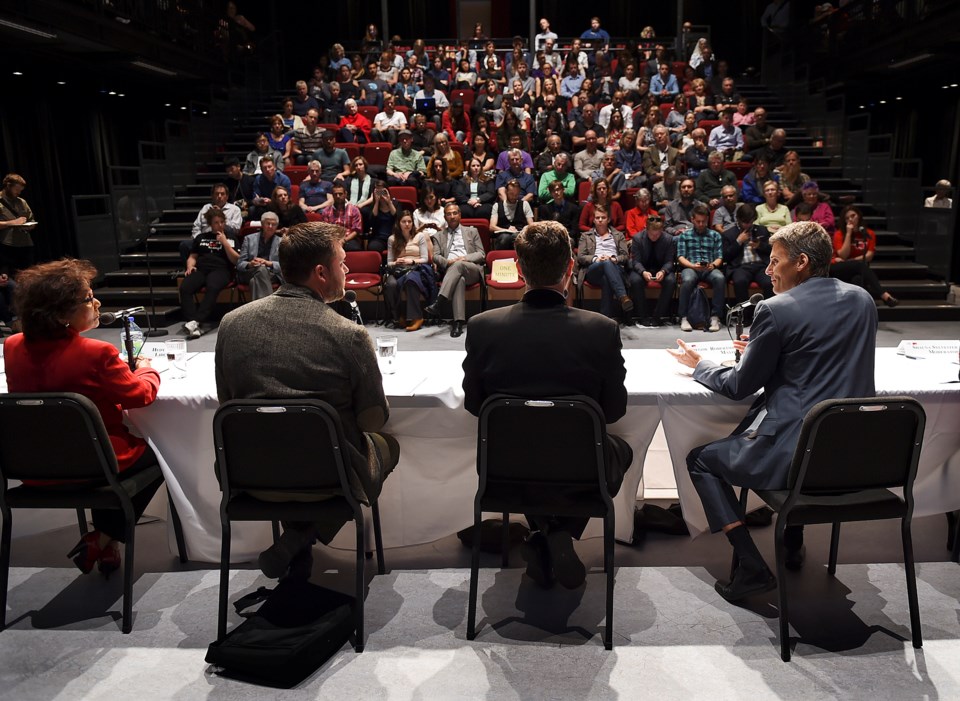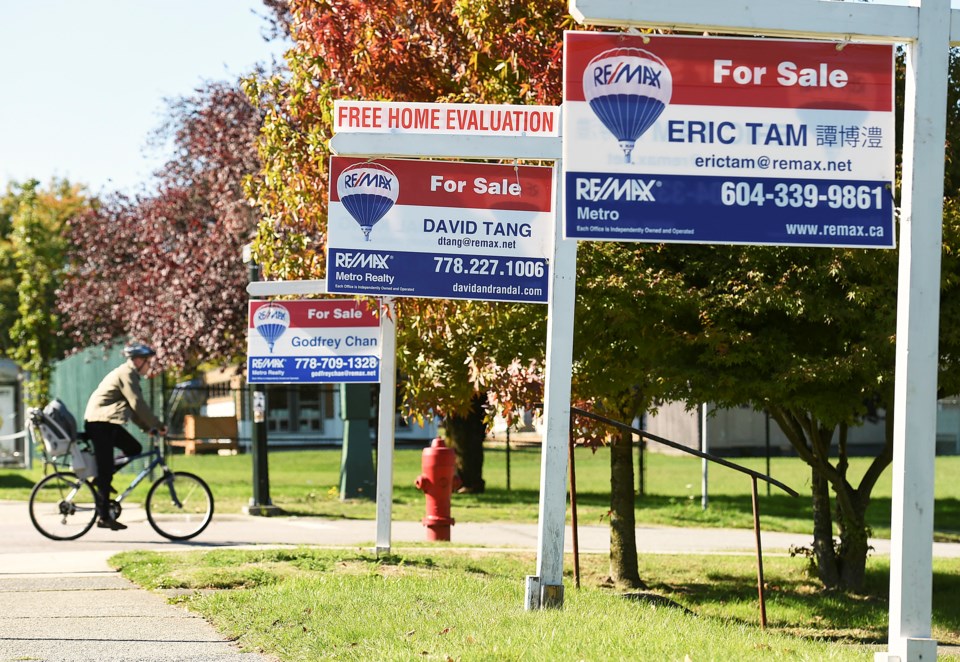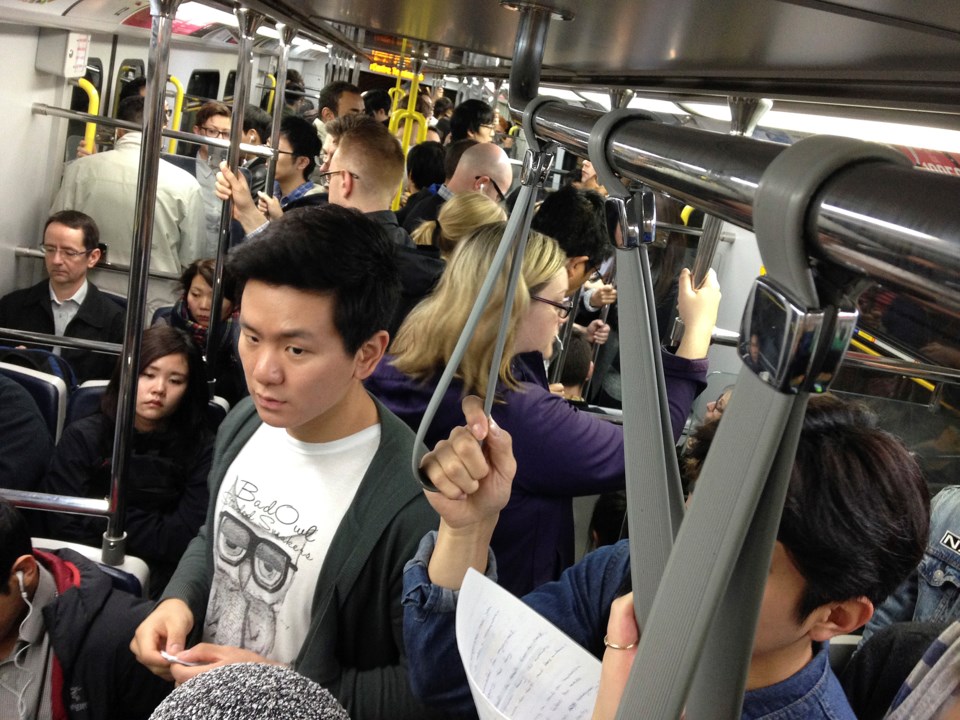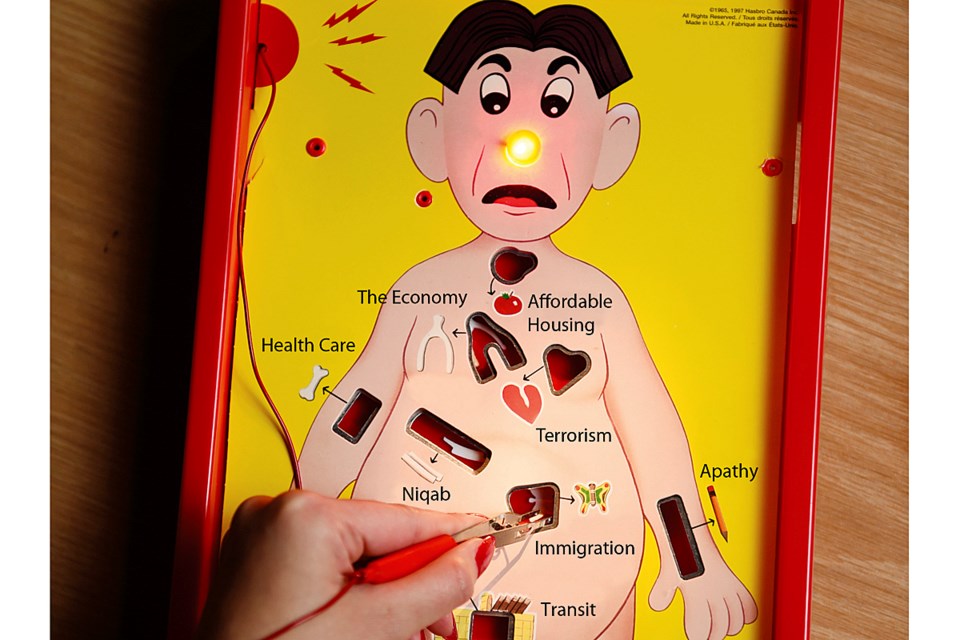Build a subway along the Broadway corridor.
Build more housing that is affordable.
Build, build, build.
Whenever Mayor Gregor Robertson talks about the major challenges Vancouver faces as a city, he goes into broken record mode: transit and housing, transit and housing, transit and housing.
He sang that tune over and over during his re-election bid in the 2014 civic election campaign and he's doing it again as voters prepare to cast ballots in the Oct. 19 federal election.
The mayor's motive is obvious: The feds are loaded with the kind of cash that can improve how people live, work and play in Vancouver. So it wasn't terribly surprising to see Robertson sit on a panel with three federal candidates last Thursday at the Annex on Seymour Street to present his case on Vancouver's needs.

His participation, however, was unprecedented.
Since Robertson was elected in 2008, he has been careful not to wade into provincial and federal campaigns, saying he will work with whichever party wins power. But there he was asking questions of Vancouver-Centre Liberal candidate Hedy Fry, Vancouver-East Green candidate Wes Regan and Burnaby-South NDP candidate Kennedy Stewart; the Conservatives failed to send a representative.
In his opening remarks, Robertson noted all four of Canada's mainstream parties pledged money for housing, transit and infrastructure. But he wanted more detail, more specifics on what Vancouver can expect from a new government in Ottawa.
So, did he get it?
"It was helpful to get more detail from the NDP, Liberals and Greens today but disappointing not to have the Conservatives represented to hear their next level of commitments," he told reporters after the forum. "We've heard clear commitments on housing, transit and infrastructure from the three parties today, and they keep elevating their commitments, which is heartening."
Much of what Robertson heard from the candidates in the way of policy and promises is posted on party websites. The NDP, Liberals and Greens are committed to a national housing strategy, investing in transit and upgrading infrastructure such as bridges and roads.
The three parties have pledged billions of dollars to cities, which they say have been paid little, if any, attention by the Conservative government of Prime Minister Stephen Harper. They accuse the Harper government of favouring the oil and gas sector and funding Conservative-friendly ridings such as Surrey, where Conservative candidate Dianne Watts recently promised $700 million towards a rapid transit line in that city.
The three parties say they want to build partnerships with cities. The Greens and NDP are committed to having an urban affairs minister in Ottawa while the Liberals look to renew a working group in Vancouver comprised of politicians from city hall, the B.C. legislature and the House of Commons.
All of it sounds promising for Vancouver.
But to see those promises through, there is the obvious challenge: Knocking off a Conservative government that despite its critics in Vancouver has managed to avoid a major tumble in the past decade and received enough support across the country to keep a secure footing in Ottawa.
Greens’ marijuana tax
Wes Regan was in his late 20s when Harper was sworn in as the country's 22nd prime minister in 2006. Now 36, with an undergrad degree in urban geography from Simon Fraser University and taking his first run at politics, Regan said the number one issue in Vancouver-East is throwing out Harper's Conservatives.
"That's sort of the root of all problems right now," he said in an interview at his Commercial Drive campaign office, a few days prior to the forum. "People, universally, just want that guy gone."
That's not a surprising sentiment in Vancouver-East, where the riding has been an NDP stronghold for decades, with the retiring Libby Davies holding the seat since 1997. In fact, as the city's political history shows, Vancouver as a whole has never been Conservative country. Aside from Wai Young's victory in Vancouver-South in the last election, and David Emerson crossing the floor from the Liberals to the Conservatives in 2006, the city has remained solidly Liberal and NDP for decades.
So Regan knows, if elected, his fellow Vancouver MPs will likely not be Conservatives. He knows, too, that before he even thinks about forging political friendships with MPs, he has to first pull off an upset and topple veteran Jenny Kwan of the NDP.
"Our numbers show us comfortably in second place right now," said Regan, who is the former executive director of the Hastings Crossing Business Improvement Association. "We've got a shot. We're feeling super positive."
What he's hearing at doorsteps is that residents want a representative in Ottawa who can do something about the city's lack of affordable housing, whether it be for low-income or middle-income people.
The Greens promise a national housing strategy that will be developed by what the party is calling a "council of Canadian governments." Modeled after an Australian organization, the council would be headed by the prime minister and include premiers and leaders from municipalities, territories and First Nations.
"We need to stop doing things in silos," said Regan, noting the Greens' housing plan also calls for a "guaranteed livable income" for Canadians and an outreach initiative to get homeless people off the street.
The party will commit $6.4 billion per year to municipal infrastructure and create a bank “to provide more robust and innovative financing and investment partnerships in order to build safer bridges, better roads, world-class water treatment facilities, affordable housing, efficient public transportation and expanded broadband access,” according to the Greens’ platform.
To pay for its promises, the Greens included revenue from the sale of marijuana in its budget. The party, which says it will legalize and tax marijuana, estimates the first year will bring in $2 billion in revenue and climb to $4.6 billion in 2016.
Though Vancouver-East includes the busy Commercial and Broadway transit hub, the mayor’s push for a subway is not top of mind for voters, according to Regan, who said in his five months on the campaign trail, "I haven't heard anyone mention the UBC subway, oddly enough."
Affordability tops the list of issues, followed by concerns about Kinder Morgan's plan to build another pipeline from Alberta to Burrard Inlet, a project that would see an increase in oil tanker traffic in Vancouver's waters.
Those were issues the civic Greens highlighted in its 2014 election campaign and the party won an unprecedented four seats — one on school board, two on park board and one on council, where Coun. Adriane Carr topped the polls.
That victory, Regan believes, will help him in his campaign, noting the wave of support the Greens received in 2014 from residents in Grandview-Woodland and the surrounding area.
"When you look at where the Green vote in the municipal election was really strong, it's this crescent that goes right through Vancouver-East," he said. "That's given us some momentum."
New deal for cities
In Vancouver-Centre, where Hedy Fry has been the Liberal MP since 1993, the cost of housing for renters and buyers has increased dramatically.
That rise could be attributed to a combination of factors, including a speculative real estate market, a low vacancy rate and the fact the federal government no longer provides incentives to developers to build rental housing.

While the NDP points to the Liberals abandoning an affordable housing program in the 1990s when Paul Martin was finance minister, Fry likes to talk about when Martin became prime minister in 2003 as a better gauge of the Liberals' commitment to housing. Besides, she said in an interview prior to the forum, it was Conservative Brian Mulroney "who walked away from it" when he was prime minister from 1984 to 1993.
Under Martin's administration, Fry said, the Liberals announced a "new deal for cities." The multi-billion dollar plan included money for housing, childcare and early learning. But in 2005, she said, the NDP colluded with the Conservatives to bring down the Liberals and the new deal vanished once the Harper era began.
"We would have been into the 10th year of a national housing strategy, we would have been into the 10th year of a national early learning and child care development program," she said, noting the plan also called for education, health and housing initiatives for First Nations.
This time around, under the leadership of Justin Trudeau, Fry supports another new deal of sorts, with the Liberals promising almost $125 billion in infrastructure investment over 10 years. Some of that money will go towards transit, affordable housing, seniors' facilities and child care centres.
In September, Trudeau announced from a City of Vancouver-leased building at Cambie and Broadway that his party will work with city hall and the provincial government to extend rapid transit along Broadway to Arbutus as part of a $20-billion investment in transit infrastructure across the country.

"The lack of federal funding will no longer be a roadblock to action," he said, fronting a stage that included Fry and several Liberal candidates from Metro Vancouver.
Fry said she wants to renew a partnership where city politicians and their counterparts in the provincial and federal governments meet regularly to make progress on major issues facing Vancouver such as transit and housing.
She recalled the now-defunct Vancouver Agreement for the Downtown Eastside came about after leaders and bureaucrats from city hall, the B.C. legislature and Parliament hashed out a plan to improve conditions in one of the poorest communities in the country.
"If government ignores British Columbia, then you have to know that any chain is as strong as its links. If one link is weak, the whole chain will fall apart. Why would we want British Columbia to be the weak link in the chain?"
$15-a-day childcare
When asked to name the top issue in the city's new Vancouver-Granville riding, NDP candidate Mira Oreck gives the same answer as Regan: Tossing out Harper.
"Overwhelmingly, the issue is about a change in government," said Oreck in an interview last week from her campaign office on Broadway. "You hear about people wanting a change. And the flipside of that coin is around who's going to be the next prime minister and what kind of leader that person will be."
Coincidentally, Oreck and Regan are members of Vision Vancouver, a link that has given them front row seats to what Robertson and his team have identified as the city's top issues.
Oreck goes way back with Robertson, having worked on his provincial campaign in 2004 when he won a seat with the NDP in Vancouver-Fairview. She became his constituency assistant and then joined Robertson as a lead communications staffer in his 2008 run for mayor.
"Working with him gave me a huge insight into what was happening behind the doors," she said, acknowledging that staff from the mayor's office have volunteered for her campaign during off-work hours.
Oreck, 37, grew up in the riding, which is one of the wealthiest in Vancouver, if not the country. It runs from Kitsilano to the north arm of the Fraser River and includes south Granville, Shaughnessy, Queen Elizabeth Park and Oakridge.
But what Oreck has seen going door-to-door are families of four living in basement suites ("I've stopped counting"), dilapidated homes ("Many houses, I'm scared to walk up the steps because they've fallen apart") and co-ops whose operating agreements are scheduled to end under the Conservatives; the NDP promises to renew the agreements.
"It worries me, having grown up here, to see the direction of this city because if we don't start to address affordability and be a partner to the city on creating and seeking every solution to create affordable housing, then we're going to be living in a very different city in a number of years," she said, noting she lived in New York City for a few years, where there are one million affordable housing units in a city of eight million people. "Affordable housing is what keeps artists and new Canadians and teachers and firefighters and all the rest able to live in a city, and it's what keeps it rich."
In a speech NDP leader Tom Mulcair gave in June at the Federation of Canadian Municipalities' conference in Edmonton, he promised to work with the Canada Mortgage and Housing Corporation to provide incentives for the construction of 10,000 affordable and market rental housing units over the next decade.
But a question on the minds of many Vancouverites is this: Is intervention by government into a free market, which has created an unaffordable reality for many would-be city dwellers, really going to make a shred of difference?
"There is no magic solution to creating affordable housing, but not being at the table is absolutely not going to create a solution," Oreck said of those who doubt anything can be done to make Vancouver an affordable place to live. "I don't accept the premise that there's nothing we can do. Can I fix the fact that homes are a fortune here? Maybe not overnight. But why have elections then, if we can't do anything about it?"
Oreck's office is located along what the city's director of transportation has called the busiest bus corridor in North America. Overloaded bus after overloaded bus rumbled by on the street outside as she spoke to the Courier.
"Not enough of them and they're all packed," she said.
The NDP has promised $1.3 billion annually over the next 20 years for transit. But the party has not come out and directly said it will fund a Broadway subway. So does a promise of billions of dollars equal a Broadway subway, or doesn’t it?
“What it equals is stable, predictable funding so that cities can plan for what their needs are,” said Oreck, before changing topics to promote the party’s $15-a day childcare plan, a platform piece that she believes is as significant as the party's housing plan.
She went on to explain that when a family pays $2,500 a month for rent, coupled with $1,500 a month to cover childcare costs for one child, "that's when things don't really add up.”
"So you address housing by addressing affordability in general and directly with childcare costs. It's not just about lowering the cost of it, but it also gives women the ability to return to the workforce."
Wai Young unavailable
Back at the forum, the federal candidates shared their disappointment that the Conservatives failed to send a candidate to discuss municipal issues.
Kennedy Stewart, an SFU politics professor on leave who once ran against Fry in Vancouver-Centre before moving to Burnaby, made a pointed crack at the Harper government: "It's too bad the Conservatives aren't here. Maybe that's why they don't elect anybody in cities."
That's been a common theme across Canada, with analysts suggesting cities’ progressive politics don’t match up with Conservative policies and values. Drug policy in Vancouver, which has led to the opening of North America’s only supervised injection site and the city’s move to regulate marijuana dispensaries, are examples.
To discuss these issues and others, the Courier made repeated requests to speak to Vancouver’s lone Conservative MP, Wai Young. In an email response, Young’s campaign manager Deanie Wong said, “unfortunately, due to our full schedule, we are not able to accommodate.”
The Courier never sent questions, saying only that a reporter wanted to interview Young about city issues. What the Courier received with Wong’s email were two pages of what effectively was a cut-and-paste job taken from Conservative party announcements and policy statements posted on the party's website.
On housing: Collect data on foreign buyer activity in Canada’s housing market and take “concrete action to address foreign non-resident real estate speculation in coordination with provinces.” Establish a new home renovation tax credit, expand the home buyers’ plan and maintain the 2015 enhancement to tax-free savings accounts that allow contributions up to $10,000.
On transit: The Conservatives will invest $250 million in 2017-2018, $500 million in 2018-2019 before reaching $1 billion by 2019-2020.
“The new fund will be merit-based, meaning that all regions shouldn’t expect transfers based on their share of the population,” the email said. “The federal government will impose a restriction on access to the new funds, saying only cities open to public-private partnerships, known as P3s, can apply.”
And in a parting political shot: “Unlike the federal Liberals and NDP, a Conservative government would finance transit without raising taxes or running deficits.”
The election is Oct. 19.
@Howellings



